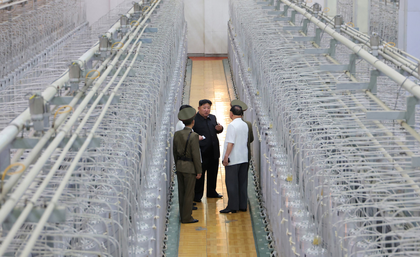Seoul says no change in radioactive levels in sea over suspected North Korean nuclear waste discharge
By IANS | Updated: July 1, 2025 14:04 IST2025-07-01T13:57:12+5:302025-07-01T14:04:03+5:30
Seoul, July 1 The South Korean unification ministry said Tuesday there has been no meaningful change in radioactive ...

Seoul says no change in radioactive levels in sea over suspected North Korean nuclear waste discharge
Seoul, July 1 The South Korean unification ministry said Tuesday there has been no meaningful change in radioactive levels in the Yellow Sea following a news report over North Korea's suspected discharge of wastewater from its uranium refining facility in North Hwanghae Province.
Daily NK, a South Korean news outlet focusing on North Korea, reported in June that North Korea has been operating a uranium refining facility in Pyongsan County and begun directly dumping uranium waste into rivers flowing into South Korea.
Seoul's unification ministry said it has been closely monitoring North Korea's nuclear activity, including that from the uranium refining plant in Pyongsan, with relevant government agencies.
"In regard to relevant agencies' regular measuring of radioactive levels in the Yellow Sea, there has been no meaningful change," a ministry official told reporters on condition of anonymity.
"But as the issue is directly related to our people's health and safety and the environment, the ministry is in close talks with other agencies over how to respond to it."
The Nuclear Safety and Security Commission (NSSC) also said its on-site measuring of radiation levels across the nation, including on the border island of Ganghwa, showed no signs of abnormality, Yonhap news agency reported.
As of 11 a.m., radiation levels across the country ranged from 0.059 to 0.212 microsieverts per hour, with Ganghwa Island recording 0.143 microsieverts per hour, all falling within the normal range of 0.05 to 0.3 microsieverts per hour, according to the NSSC.
Recent satellite imagery indicates the construction of a suspected uranium enrichment plant at North Korea's main nuclear complex in Yongbyon, north of Pyongyang, Beyond Parallel, a US-based monitoring program, said last month, in a possible sign of the North's efforts to boost its nuclear arsenal.
Disclaimer: This post has been auto-published from an agency feed without any modifications to the text and has not been reviewed by an editor
Open in app